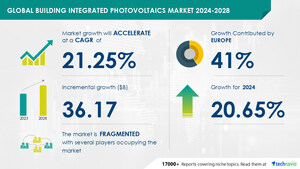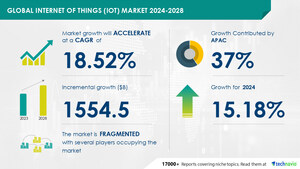NEW YORK, Oct. 28, 2024 /PRNewswire/ -- Report with the AI impact on market trends - The Global Electronic Display Devices Market size is estimated to grow by USD 47.7 billion from 2024-2028, according to Technavio. The market is estimated to grow at a CAGR of 5.1% during the forecast period. New electronic display devices launches is driving market growth, with a trend towards innovation in display technology However, disposal of e-waste poses a challenge.Key market players include Apple Inc., BOE Technology Group Co. Ltd., Corning Inc., DuPont de Nemours Inc., E Ink Holdings Inc., Fujitsu Ltd., HP Inc., Innolux Corp., Leyard Optoelectronic, LG Display Co. Ltd., Mitsubishi Electric Power Products, Inc., NEC Corp., Panasonic Holdings Corp., Powertip Technology Corp, Royole Corp, Samsung Electronics Co. Ltd., Sharp Corp., Sony Group Corp., TCL Industries Holdings Co., Ltd., and Universal Display Corp..
AI-Powered Market Evolution Insights. Our comprehensive market report ready with the latest trends, growth opportunities, and strategic analysis- View your snapshot now
Forecast period |
2024-2028 |
Base Year |
2023 |
Historic Data |
2018 - 2022 |
Segment Covered |
Type (Televisions, Smartphones and tablets, Smart wearables, PC and laptop, and Others), End-user (Commercial and Residential), and Geography (APAC, North America, Europe, South America, and Middle East and Africa) |
Region Covered |
APAC, North America, Europe, South America, and Middle East and Africa |
Key companies profiled |
Apple Inc., BOE Technology Group Co. Ltd., Corning Inc., DuPont de Nemours Inc., E Ink Holdings Inc., Fujitsu Ltd., HP Inc., Innolux Corp., Leyard Optoelectronic, LG Display Co. Ltd., Mitsubishi Electric Power Products, Inc., NEC Corp., Panasonic Holdings Corp., Powertip Technology Corp, Royole Corp, Samsung Electronics Co. Ltd., Sharp Corp., Sony Group Corp., TCL Industries Holdings Co., Ltd., and Universal Display Corp. |
Key Market Trends Fueling Growth
The electronic display devices market is experiencing a notable evolution due to technological innovations, with quantum dot (QD) technology being a key driver. This technology is revolutionizing both the display and lighting sectors by offering customizable color emission and enhanced brightness, resulting in high-quality visuals and energy-efficient illumination. QD technology addresses critical challenges related to color accuracy and brightness, as traditional displays can struggle to maintain color fidelity at higher brightness levels. Companies like Samsung have incorporated this technology into their light-emitting diode (LED) displays, enhancing luminous efficiency and ensuring exceptional color purity. With a narrow emission linewidth (<30 nm compared to >60 nm for traditional LEDs), QDs significantly improve color purity, enabling high-fidelity color reproduction, especially important for next-generation display technologies. QD technology increases the color gamut on liquid-crystal displays (LCDs) by up to 50%, resulting in more saturated and vivid colors. The adoption of quantum dot technology is a significant trend in the electronic display devices market, driving improvements in display performance and setting new industry standards. At events like ISE 2024, companies showcased their latest advancements, pushing the boundaries of display technology. This technology's benefits, including enhanced color accuracy, brightness, and energy efficiency, are transforming the market and setting new benchmarks for display performance, ensuring continued growth during the forecast period.
The Electronic Display Devices market is thriving, with Televisions leading the way in terms of revenue. Higher resolution screens, such as 4K and 8K, are becoming increasingly popular for both home entertainment and professional use. Flexible display screens, using technologies like OLED and AMOLED, are gaining traction in the automobile industry and mobiles. Low energy consumption and high-quality screens are essential for consumer electronic devices, including LCD and LED displays. High-resolution display technologies are also crucial for digital signage applications in the retail sector, advertising methods, and entertainment industries. The healthcare and console gaming sectors also benefit from advanced display technologies like 3D and 4D displays. The market is expected to grow further with the development of flexible AMOLED displays and rigid LCD displays for various consumer electronics applications.
Insights on how AI is driving innovation, efficiency, and market growth- Request Sample!
Market Challenges
- The electronic display devices market encompasses various products such as smartphones, tablets, and televisions. With increasing usage and frequent upgrades, these devices reach the end of their lifecycle, leading to significant e-waste generation. The UN defines e-waste as discarded devices with batteries or plugs, containing hazardous substances like mercury. In 2021, the global e-waste generation was approximately 57.4 million tons, with only 17.4% being properly recycled. The ITU identifies e-waste as a complex waste stream due to the presence of valuable materials and hazardous toxins. Efficient material recovery and safe recycling are essential for economic and environmental health. Neglecting e-waste disposal may hinder market growth, emphasizing the need for effective management and consumer education.
- The Electronic Display Devices market is thriving with advancements in high-resolution display technologies, including OLED and AMOLED. Consumer electronic devices, digital signage applications, and smart devices are major sectors driving demand. Flexible AMOLED displays and rigid LCD displays cater to various consumer electronics applications and digital signage in retailing, entertainment, healthcare, console gaming, mobile gaming, and more. The market faces challenges such as the need for energy-efficient and cost-effective displays, disposal of WEEE and e-waste, and the emergence of advanced electronic gadgets like smartphones, tablets, laptops, smart TVs, smartwatches, and automobiles. Industries like automation, mobile commerce, and advertising are also adopting electronic displays. High-resolution displays enhance video streaming experiences on Cathode ray tubes, plasma displays, LED displays, and OLED displays. The entertainment industry and M-commerce are significant markets, influenced by disposable incomes.
Insights into how AI is reshaping industries and driving growth- Download a Sample Report
Segment Overview
This electronic display devices market report extensively covers market segmentation by
- Type
- 1.1 Televisions
- 1.2 Smartphones and tablets
- 1.3 Smart wearables
- 1.4 PC and laptop
- 1.5 Others
- End-user
- 2.1 Commercial
- 2.2 Residential
- Geography
- 3.1 APAC
- 3.2 North America
- 3.3 Europe
- 3.4 South America
- 3.5 Middle East and Africa
1.1 Televisions- The electronic display devices market, specifically the television segment, is experiencing notable growth and innovation. Companies like Xiaomi and LG are leading this charge with the introduction of advanced technologies and diverse product offerings. Xiaomi, a Chinese smartphone manufacturer, recently launched its X Pro QLED TVs in India, available in 43-inch, 55-inch, and 65-inch screen sizes. These premium offerings cater to consumers seeking high-quality viewing experiences. Simultaneously, LG, a South Korean electronics giant, introduced a new range of AI-driven smart TVs, featuring 55 models with screen sizes from 43 inches to an impressive 97 inches. This trend towards larger screens reflects consumers' growing preference for home entertainment experiences. Additionally, the integration of AI technology, such as LG's real-time upscaling, is becoming increasingly common. As consumer preferences evolve, larger screens and AI integration will shape the future of the television segment and the global electronic display devices market, ensuring continued growth during the forecast period.
Download complimentary Sample Report to gain insights into AI's impact on market dynamics, emerging trends, and future opportunities- including forecast (2024-2028) and historic data (2018 - 2022)
Research Analysis
Electronic displays have revolutionized the way we interact with technology, from high-resolution televisions and monitors to mobile devices and digital signage. The market for electronic displays is vast and diverse, encompassing various technologies such as OLED (Organic Light-Emitting Diode) and AMOLED (Active-Matrix Organic Light-Emitting Diode) displays. These advanced display technologies offer superior image quality, higher contrast, and improved energy efficiency. Consumer electronic devices, including smartphones, tablets, laptops, and smartwatches, are major applications for electronic displays. High-resolution displays are increasingly popular in consumer electronics, enabling better video streaming and gaming experiences. Flexible AMOLED displays offer unique advantages in the form factor and design of devices. Beyond consumer electronics, electronic displays have significant applications in digital signage, automobiles, and various industries such as retailing, entertainment, healthcare, and automation. Digital signage is a growing market for electronic displays, with applications ranging from advertising and information dissemination to wayfinding and interactive installations. Traditional display technologies like cathode ray tubes and plasma displays have largely been replaced by more advanced and energy-efficient LED displays. The electronic market for displays is expected to grow further with the development of new technologies and applications.
Market Research Overview
Electronic displays have revolutionized various industries, from consumer electronics to digital signage, automobiles, and entertainment. High-resolution display technologies, including OLED (Organic Light-Emitting Diodes) and AMOLED (Active-Matrix Organic Light-Emitting Diodes), have taken center stage, offering high-quality screens with low energy consumption and screen durability. Consumer electronic devices, such as smartphones, tablets, laptops, and smart televisions, have significantly benefited from these advanced display technologies. OLED and AMOLED displays offer higher resolution screens, better color accuracy, and improved contrast ratios, enhancing the user experience. Flexible AMOLED displays have gained popularity in the market, enabling the production of curved and foldable devices. Rigid LCD displays, on the other hand, continue to dominate digital signage applications in retail, advertising, and entertainment industries. The retail sector, entertainment industry, and automobile industry are major consumers of electronic displays. Digital signage has become an essential advertising method, while advanced electronic gadgets like smartwatches and mobile devices have become ubiquitous. The consumer electronics market is driven by disposable incomes, mobile commerce, and the growing popularity of video streaming services. The entertainment industry, including console gaming and mobile gaming, also relies heavily on high-resolution displays for experience. E-waste and WEEE (Waste Electrical and Electronic Equipment) have become significant concerns, with the need for sustainable manufacturing and disposal methods becoming increasingly important. The future of electronic displays lies in continued innovation, focusing on higher resolution screens, lower power consumption, and flexible and durable designs.
Table of Contents:
1 Executive Summary
2 Market Landscape
3 Market Sizing
4 Historic Market Size
5 Five Forces Analysis
6 Market Segmentation
- Type
- Televisions
- Smartphones And Tablets
- Smart Wearables
- PC And Laptop
- Others
- End-user
- Commercial
- Residential
- Geography
- APAC
- North America
- Europe
- South America
- Middle East And Africa
7 Customer Landscape
8 Geographic Landscape
9 Drivers, Challenges, and Trends
10 Company Landscape
11 Company Analysis
12 Appendix
About Technavio
Technavio is a leading global technology research and advisory company. Their research and analysis focuses on emerging market trends and provides actionable insights to help businesses identify market opportunities and develop effective strategies to optimize their market positions.
With over 500 specialized analysts, Technavio's report library consists of more than 17,000 reports and counting, covering 800 technologies, spanning across 50 countries. Their client base consists of enterprises of all sizes, including more than 100 Fortune 500 companies. This growing client base relies on Technavio's comprehensive coverage, extensive research, and actionable market insights to identify opportunities in existing and potential markets and assess their competitive positions within changing market scenarios.
Contacts
Technavio Research
Jesse Maida
Media & Marketing Executive
US: +1 844 364 1100
UK: +44 203 893 3200
Email: [email protected]
Website: www.technavio.com/
SOURCE Technavio

WANT YOUR COMPANY'S NEWS FEATURED ON PRNEWSWIRE.COM?
Newsrooms &
Influencers
Digital Media
Outlets
Journalists
Opted In




Share this article